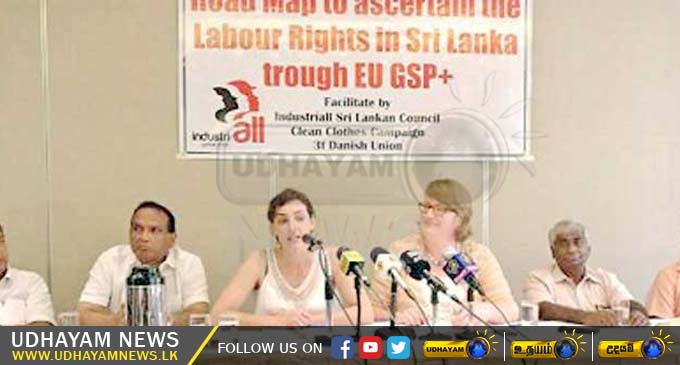(UDHAYAM, COLOMBO) – Sri Lanka must adhere to core conventions of the International Labour Organization and deliver on its promise of guaranteeing employee rights if the country looks to regain its preferential trade status, Members of European Parliament (MEPs) said.
A fact-finding mission including two Members of the European Parliament (MEPs) visited Sri Lanka last week to evaluate the country’s respect for labour rights prior to the European Union’s decision on granting Sri Lanka preferential trade access.
After three days of meetings with employees in Sri Lanka’s Free Trade Zone factories, union leaders and Labour Minister John Seneviratne from 10-12 April, the mission said Sri Lanka must ensure its workers have the effective right to organise and bargain collectively if the country is to be granted preferential trading conditions by the European Union.
The MEPs, Anne-Marie Mineur and Lola Sánchez Caldentey, met with workers, unions, employers, the International Labour Organization (ILO) and key Government figures.
Following the mission member of the delegation MEP Caldentey in a statement said the European Union should not grant special trade status to Sri Lanka if the money coming from the advantages of this status would remain only in the pockets of a few businessmen.
“We are willing to give preferences to Sri Lanka, but only if we are sure that the benefit also goes to the workers,” she said.
MEP Anne-Marie Mineur said it is the Government’s obligation to effectively guarantee the fundamental rights of workers and their trade unions.
“Collective bargaining and the right to strike should be an integral part of this. The Government must ensure that these workers can organise themselves through trade unions, because otherwise exploitation will continue.”
Participants in the mission were invited by the IndustriALL Sri Lanka Council to assess the country’s progress in human and labour rights compliance in relation to the reapplication by the Government of Sri Lanka for the EU’s Generalized System of Preferences Plus status (GSP+).
The delegation, which also included representatives from trade union 3F of Denmark, the International Transport Workers Federation (ITWF) and Clean Clothes Campaign (CCC), met workers and trade union leaders who have been subject to harassment, illegal dismissal, sexual harassment and labour rights violations in the Free Trade Zones of Sri Lanka.
The delegates expressed their concerns about the extensive use of manpower agencies for co-working arrangements, which have undermined freedom of association and collective bargaining in Sri Lanka. They were also worried that the judiciary has been increasingly interfering in labour disputes and collective bargaining to the detriment of trade unions.
“It is good that EU Parliamentarians have been to Sri Lanka to see for themselves the conditions for workers. We hope that this will encourage the EU to put proper protections in place to ensure that the benefits of trade are passed on to Sri Lankan workers. Full respect for the rights to freedom of association and to bargain collectively is essential,” IndustriALL’s Assistant General Secretary Jenny Holdcroft, said in response to the fact finding mission’s statement.
According to the Clean Clothes Campaign, the MEPs expressed concern over the implementation of legislation that was to address human rights violations. They also pointed to the negative effects of the extensive use of temporary workers agencies on freedom of association and collecting bargaining rights, and highlighted that the judiciary has increasingly been interfering in labour disputes and collective bargaining to the detriment of trade unions.
Following the investigation, Minister of Labour, John Seneviratne, has expressed his commitment to ensuring at least 50% of the benefits of the GSP+ status will go to the workers, according to MEP Mineur.
“We obviously welcome this engagement, but we still don’t know how the Government will deliver on this promise. From our perspective, the first step to make sure that the benefits get to the workers is to make sure that they have the effective right to organise and bargain collectively. Signing a convention is just the beginning, the real challenge is to implement it; to ensure that the workers not only have the theoretical right to organise, but also that, in reality, there is no harassment towards trade unions by the employers,” the MEPs said.
The European Union is due to assess Sri Lanka’s application for GSP+ status over the next month.
Courtesy: Daily FT

